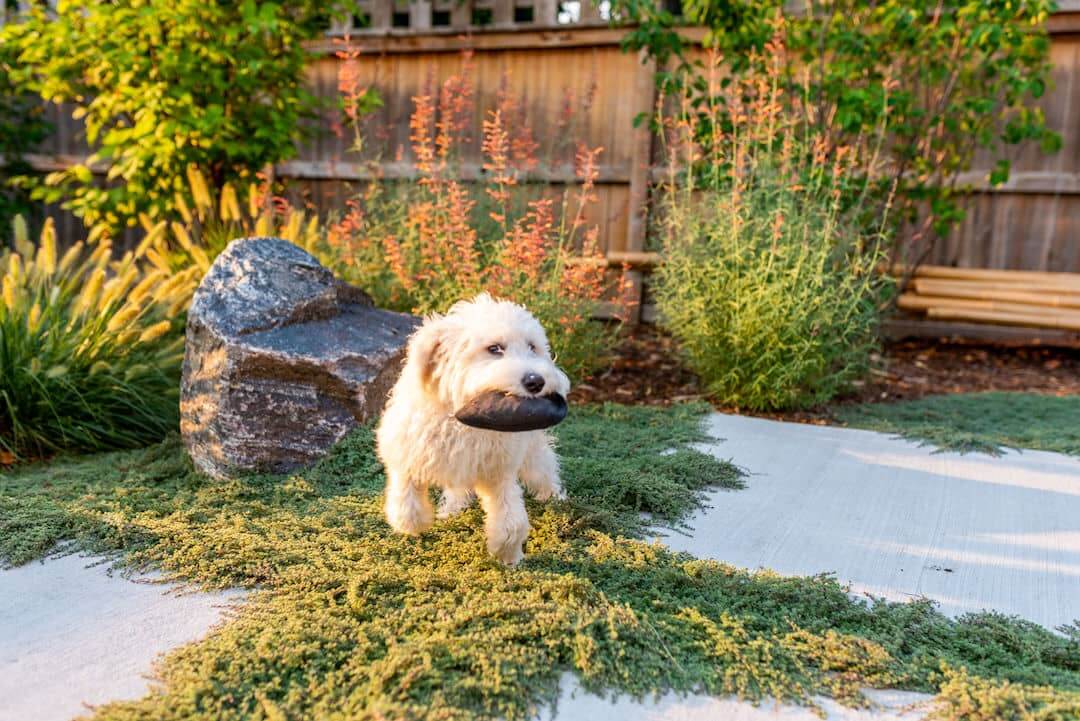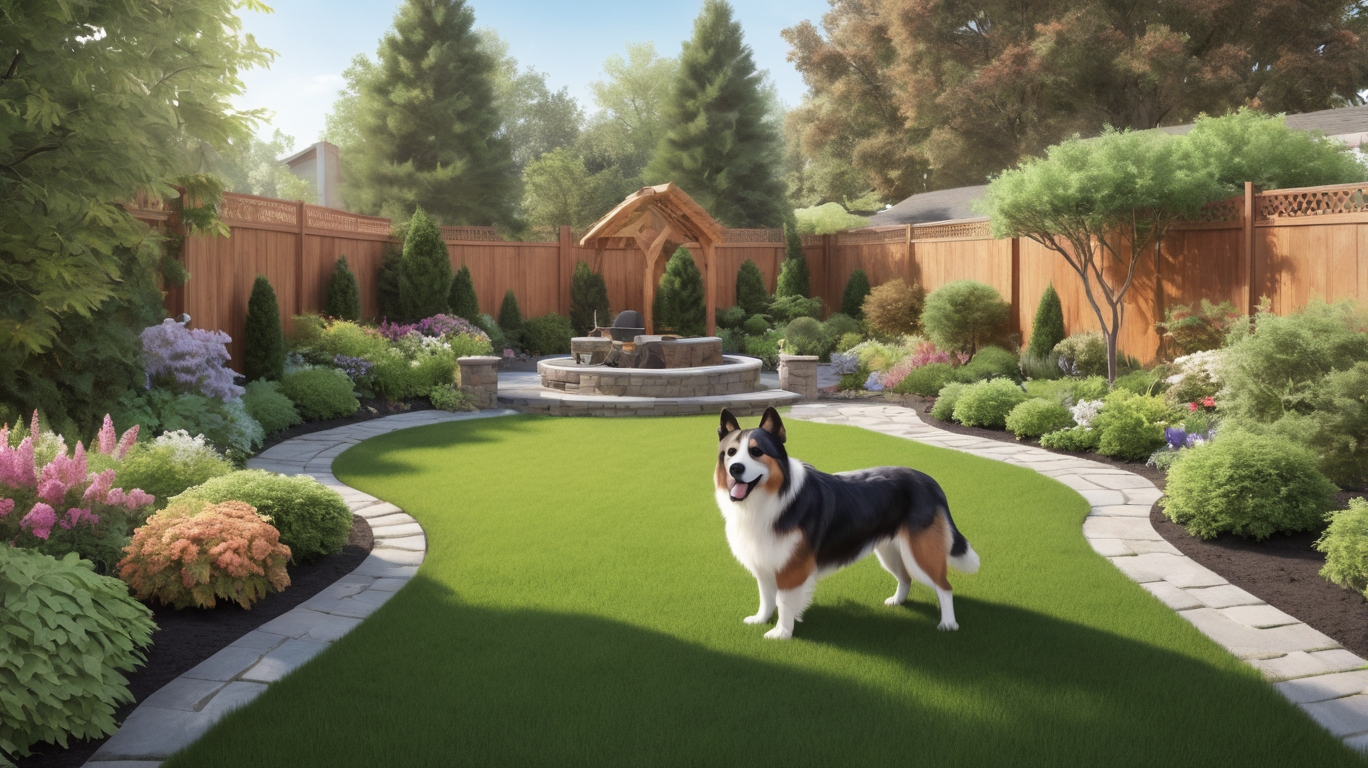Creating a dog-friendly backyard can be a rewarding project. It ensures your furry friend enjoys a safe and fun outdoor space.
Designing a backyard that caters to your dog’s needs is not just about aesthetics. It’s about creating an environment where your pet can play, explore, and relax. Dogs need space to roam, safe areas to play, and secure boundaries. This means thinking about what materials to use, how to lay out the space, and what features to include.
From digging zones to shady spots, the possibilities are endless. A well-planned dog-friendly backyard can improve your pet’s quality of life. Plus, it can add to the overall enjoyment of your outdoor space. Ready to transform your yard into a dog haven? Let’s get started!
Designing Safe Spaces
Creating a safe and enjoyable backyard for your dog is essential. Your furry friend needs a secure space to play, explore, and relax. This section will guide you through designing these safe spaces, focusing on fencing options and avoiding toxic plants.
Fencing Options
Fencing is crucial for keeping your dog safe. It prevents them from wandering off or encountering danger. Here are some common fencing options:
- Wooden Fences: Sturdy and provide privacy. Ensure there are no gaps or holes.
- Chain-Link Fences: Durable and affordable. Consider using a vinyl coating for added safety.
- Invisible Fences: Use a buried wire and a collar. Train your dog to understand the boundaries.
- Vinyl Fences: Low maintenance and weather-resistant. Choose a height that your dog cannot jump over.
Each type of fence has its benefits. Choose one that fits your budget and your dog’s needs.
Avoiding Toxic Plants
Some plants can be harmful to dogs. It’s important to identify and avoid these in your backyard. Here are a few common toxic plants:
| Plant | Effect on Dogs |
|---|---|
| Aloe Vera | Can cause vomiting and diarrhea. |
| Azalea | Leads to drooling, vomiting, and diarrhea. |
| Oleander | Causes severe digestive issues and heart problems. |
| Sago Palm | Can result in liver failure and death. |
For a safer backyard, opt for non-toxic plants. Here are some dog-friendly options:
- Marigolds: Bright and safe for dogs.
- Sunflowers: Non-toxic and cheerful.
- Petunias: Safe and colorful.
- Herbs like Basil and Rosemary: Safe and useful.
By choosing the right plants, you ensure your dog’s safety and create a beautiful garden.

Credit: sunriselandscapeportland.com
Dog-friendly Plants
Designing a backyard for your furry friend? Consider dog-friendly plants. These plants provide a safe and enjoyable environment for your pet. They also add beauty and greenery to your yard. But which plants are safe for dogs? Let’s explore some non-toxic and edible options.
Non-toxic Choices
Choosing non-toxic plants is essential. Your dog might nibble on leaves or flowers. Some safe choices include marigolds, sunflowers, and snapdragons. These plants are beautiful and harmless to dogs. Lavender is another great option. It smells wonderful and is safe for dogs.
Roses are also non-toxic. They add a classic touch to your garden. Just watch out for the thorns. Camellias are another safe choice. They have lovely flowers and are dog-friendly. Zinnias are bright and colorful. They are also safe for your furry friend.
Edible Plants
Why not include some edible plants? They can be a fun treat for your dog. Carrots are a great option. Dogs love to chew on them. They are healthy and safe. Blueberries are another good choice. They are small, delicious, and full of antioxidants. Dogs enjoy them too.
Strawberries are also safe and tasty. They are easy to grow and fun to pick. Peas can be a good addition. Dogs like their sweet taste. They are also nutritious. Spinach is another option. It is full of vitamins and safe for dogs.
Remember to monitor your dog in the garden. Ensure they do not eat too much. Balance is key for a healthy diet. With these plants, your yard will be beautiful and safe for your dog.
Creating Shade And Shelter
Creating shade and shelter in your backyard is essential for your dog’s comfort. Dogs need a cool place to escape the sun and protection from the weather. Providing the right environment keeps them happy and healthy.
Natural Shade Solutions
Trees are the perfect natural shade providers. Planting large trees in your backyard offers ample cover. Choose trees with broad leaves for the best shade. Trees like maple, oak, or elm are excellent options. They grow large and provide plenty of shade. Remember to keep your dog safe from falling branches.
Vines are another great option. Grow vines on a pergola or trellis. This creates a shady spot for your dog to relax. Vines like wisteria and grape are good choices. They grow quickly and provide dense foliage.
Building Dog Houses
A dog house offers excellent shelter. It protects your dog from the elements. Choose a sturdy, weather-resistant material. Wood is a popular choice. Ensure the dog house is large enough for your dog to turn around. Ventilation is important too. Proper airflow keeps the dog house cool in summer.
Insulation helps in all seasons. It keeps the dog house warm in winter and cool in summer. Add a comfortable bed inside. Your dog will appreciate a cozy place to rest. A raised floor keeps it dry and prevents dampness. Make sure the entrance faces away from prevailing winds. This keeps the interior warm and dry.

Credit: www.environmentaldesigns.com
Water Features For Dogs
Creating a backyard haven for your dog can be a fun project. Water features can add excitement and comfort for your pet. Dogs love water. Adding water features can keep them happy and cool. Let’s explore some water feature ideas for your furry friend.
Splash Zones
Splash zones are great for playful dogs. These areas can be simple or elaborate. A shallow pool with a gentle spray can be perfect. It allows dogs to splash and play safely. Use non-slip surfaces to prevent accidents. Splash zones can also be a fun place for kids to join in the fun. Make sure the water is always fresh and clean.
Diy Dog Pools
A DIY dog pool is a great addition to any backyard. You can build one with basic materials. Use a plastic kiddie pool for a quick solution. You can also dig a shallow hole and line it with waterproof material. Add a small ramp for easy access. Keep the water level low to ensure safety. Clean the pool regularly to keep it hygienic. A DIY dog pool can provide hours of fun for your dog.
Interactive Play Areas
Creating interactive play areas in your backyard can enhance your dog’s well-being. Dogs love to play, explore, and stay active. Designing spaces for agility and digging can provide mental stimulation and physical exercise.
Agility Courses
An agility course can keep your dog entertained and healthy. Use simple items like tunnels, ramps, and weave poles. Set them up in different patterns to keep it exciting.
- Tunnels: Dogs love to run through tunnels.
- Ramps: Great for climbing and balancing.
- Weave Poles: Enhance coordination and agility.
Use durable, non-toxic materials for safety. Start with simple tasks and gradually increase difficulty.
Digging Spots
Many dogs love to dig. Creating a designated digging spot can save your garden. Choose a corner of your yard and fill it with loose soil or sand.
| Materials | Benefits |
|---|---|
| Loose Soil | Easy to dig, safe for paws |
| Sand | Fun texture, low maintenance |
Encourage your dog to dig there by burying toys or treats. This can keep your dog busy and protect your plants.

Credit: www.houselogic.com
Comfortable Resting Areas
Designing comfortable resting areas in your backyard for dogs ensures they have a cozy spot to relax. Create shady nooks with soft grass or pet-friendly mats. Add durable, weather-resistant dog beds for extra comfort.
Creating a relaxing spot for your dog in the backyard is essential. Comfortable resting areas help them stay calm and content. They also ensure your dog has a place to unwind after play.
Outdoor Dog Beds
Outdoor dog beds provide a cozy spot for your pet. These beds are designed to withstand weather changes. Opt for beds with waterproof or water-resistant materials. This ensures the bed stays dry and lasts longer. Elevated beds help keep your dog cool and comfortable.
Cooling Mats
Cooling mats are perfect for hot days. These mats help regulate your dog’s body temperature. Many cooling mats use gel that absorbs heat. They are easy to clean and maintain. Place the mat in a shaded area for extra comfort.
“`
Pathways And Trails
Creating pathways and trails in your backyard is essential for your dog’s well-being. Dogs love to explore and having designated paths helps keep them safe. These trails also prevent your yard from becoming a mess. Let’s explore some key aspects of making dog-friendly pathways.
Safe Materials
Choosing the right materials for your pathways is crucial. You want something safe for your dog’s paws and durable enough to withstand wear and tear.
- Pea Gravel: Soft and gentle on paws, easy to clean.
- Mulch: Natural look, but avoid cocoa mulch as it’s toxic to dogs.
- Flagstone: Durable and non-slip, but can get hot in the sun.
- Concrete: Very durable, but ensure it’s smooth to avoid injuries.
Using a combination of these materials can create a visually appealing and functional pathway for your dog.
Navigating Slopes
Slopes in your yard can be challenging for dogs. It’s important to make these areas safe and accessible.
- Gradual Inclines: Ensure slopes are gentle. Steep slopes can be dangerous.
- Steps or Ramps: Install steps or ramps for steep areas. This makes it easier for dogs to navigate.
- Non-Slip Surfaces: Use non-slip materials to prevent falls. Textured surfaces or rubber mats work well.
By considering these factors, you can create a safe and enjoyable environment for your dog to explore. Always think about your dog’s comfort and safety when designing pathways and trails.
Maintenance Tips
Maintaining a dog-friendly backyard requires regular care. These tips ensure a safe and clean space for your furry friend. They help keep the yard inviting and trouble-free. Focus on these important aspects.
Regular Cleaning
Clean the yard regularly. Remove any waste promptly. This prevents bad odors and keeps the area sanitary. Rake leaves and debris to avoid hiding places for pests. Trim overgrown plants to create a clear, open space. Regularly wash any outdoor dog toys. Clean water bowls to prevent algae and bacteria.
Pest Control
Monitor the yard for pests. Fleas, ticks, and mosquitoes can harm your dog. Use pet-safe pest control methods. Check your dog for ticks after spending time outside. Keep grass mowed to reduce hiding spots for pests. Plant pest-repellent plants like lavender or marigolds. These tips help maintain a pest-free yard.
Frequently Asked Questions
How Do I Make My Backyard Dog-friendly?
Create shaded areas, use pet-safe plants, and install non-toxic ground covers. Provide water sources and safe play zones.
What Are The Best Ground Covers For Dogs?
Artificial turf, pea gravel, and mulch are great options. They are durable and easy to clean.
How Can I Prevent My Dog From Digging?
Designate a digging zone with sand or soil. Train your dog to use this specific area.
Are Certain Plants Harmful To Dogs?
Yes, some plants like lilies and azaleas are toxic. Choose pet-safe plants like marigolds and sunflowers.
Conclusion
Creating a dog-friendly backyard is essential for happy pets. Safety, comfort, and fun should be your focus. Add shaded areas, secure fencing, and engaging activities. Your dog will enjoy the space and feel more at home. Remember, simple changes can make a big difference.
Think about their needs and make adjustments. Happy dogs mean happy owners. Enjoy your new pet-friendly backyard!

Leave a Reply